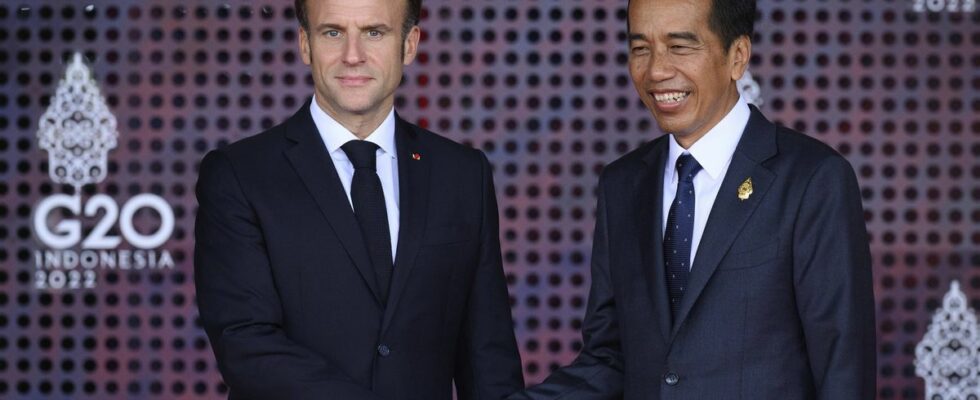French President Emmanuel Macron will try to relaunch France’s strategic ambitions in Asia-Pacific this week, undermined by the crisis with Australia over a mega-submarine contract.
He will hold talks with regional heavyweights, including Chinese President Xi Jinping and Indian Prime Minister Narendra Modi, on the sidelines of the G20 summit in Indonesia on Tuesday and Wednesday.
A “recognition” of France’s ambitions and influence
Above all, he hopes for a “recognition” of France’s ambitions and influence at the summit of the Asia Pacific Economic Cooperation Forum (Apec), Thursday and Friday in Bangkok, where it will be the first European country invited.
The challenges are numerous, from the size of the area in which France is trying to project itself, more than 10,000 kilometers from Europe, to the weakness of the means deployed by Paris, in particular military.
Emmanuel Macron has made this vast area stretching from the East African coasts to the West American coasts a strategic priority – hence its name “Indo-Pacific” – where France has many territories and maritime areas.
“Carrying the Indo-Pacific Will”
“We have an ambition to carry the Indo-Pacific will”, underlined the French presidency on the sidelines of the G20 summit.
This nerve center of world trade will house 60% of the world’s population and GDP in 2030. The scene of a growing rivalry between China and the United States, all attention is focused on it.
France holds most of its exclusive economic zone (EEZ) there, the second in the world, around seven territories, from Reunion to New Caledonia and Tahiti, where 1.65 million nationals live.
A leading right of inspection
This vast maritime space gives it a leading right of scrutiny on all environmental and fisheries issues, as well as the fight against ocean-related trafficking.
France is also increasingly present militarily, favoring, in addition to its own points of support, growing cooperation with neighboring countries.
It is increasing joint exercises (India, Japan) and patrols in the China Sea, an area which concentrates tensions and where Beijing is increasing its demands.
A “big slap”
The conclusion of the AUKUS alliance between Australia, the United States and the United Kingdom, with the corollary of the cancellation by Canberra of a contract for the acquisition of 12 French submarines, strongly thwarted these ambitions in 2021.
“The big slap is not having been invited, even on a jump seat, in the AUKUS alliance”, notes geopolitics expert Jean-Marc Balencie.
France has since strengthened its cooperation with Indonesia, a major regional power (270 million inhabitants), and intends to multiply these partnerships.
Warming of relations with the AUKUS alliance
Jakarta signed a first contract in February to acquire French Rafale fighter jets and is interested in submarines, corvettes and other military equipment.
Emmanuel Macron has also reconciled with his American counterpart Joe Biden, who has made amends in the AUKUS affair and is expecting him on December 1 in Washington for a state visit.
It is also time for warming up with Australia and its new Prime Minister, Anthony Albanese. Paris could even be in line again to sell submarines to Australia while waiting for those promised by the United States.
“We can play this way of third actor”
The AUKUS affair is also likely to have an unexpected positive effect by demonstrating France’s non-alignment with Washington, while many states in the region refuse to choose between the United States and China.
“AUKUS paradoxically gave us some arguments, we can play this way of third actor”, advances Admiral Pascal Ausseur, general manager of the Mediterranean Foundation for Strategic Studies (FMES). “We don’t have a boulevard because the two big ones don’t leave us much room, but there is a place”.
A new Indo-Pacific approach of the European Union
France’s room for maneuver also remains constrained militarily. Only 7,000 soldiers are permanently deployed in the area, as well as a few patrol boats and reconnaissance aircraft.
“Its sovereignty forces in the area are saturated by territorial surveillance missions”, notes Céline Pajon at theFrench Institute of International Relations (Ifri). The French strategy is part of the new Indo-Pacific approach of the European Union. “This, to convince, must be implemented in a concrete way as quickly as possible, be readable and visible”, warns the researcher.

